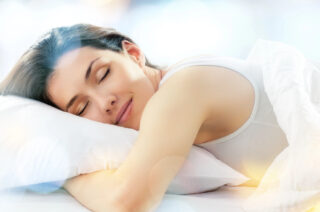
More Sleep Articles
Beauty Sleep Is Real: How Sleep Affects Skin, Hormones, and Aging

The idea of “beauty sleep” isn’t just a saying — there’s real science behind it. For women especially, getting enough high-quality sleep is a vital part of maintaining healthy skin, balanced hormones, and a more youthful appearance. When sleep is disrupted or inadequate, it shows — not just in how we feel, but in how we look.
During deep sleep, the body enters a state of repair and regeneration. This includes the skin, which produces new collagen, repairs environmental damage, and restores moisture balance. Chronic sleep deprivation can interfere with this natural process, leading to increased signs of aging such as fine lines, dullness, and puffy eyes.
Sleep also plays a crucial role in hormonal balance, particularly for women. Disrupted sleep can affect levels of estrogen and progesterone — hormones that not only regulate reproductive health but also influence mood, skin texture, and even hair growth. Poor sleep may also elevate cortisol, the stress hormone, which is associated with inflammation and skin conditions such as acne, eczema, and premature aging.
One of the most visible signs of poor sleep is the appearance of the under-eye area. Blood vessels under the eyes dilate when sleep is lacking, creating the appearance of dark circles. Swelling and fluid retention can lead to puffiness, particularly in the morning. While topical products may help, the best long-term remedy is consistent, restorative sleep.
Sleep problems disproportionately affect women, particularly during hormonal transitions such as pregnancy, perimenopause, and menopause. Hot flashes, night sweats, anxiety, and insomnia are all common issues that can interrupt rest and impact both appearance and well-being.
Establishing a consistent bedtime, avoiding screens before sleep, and keeping the bedroom cool and dark can support better sleep quality. For women struggling with chronic insomnia or other sleep disorders — including restless legs syndrome or sleep apnea — professional evaluation may be needed. These conditions are often underdiagnosed in women, especially when symptoms don’t fit the “classic” profile.
Ultimately, good sleep is one of the most powerful — and natural — beauty tools available. It supports skin health, hormonal stability, and energy levels, helping women not only look better, but feel better too.
Other Articles You May Find of Interest...
- Understanding BiPAP Therapy: A Comprehensive Guide to Its Benefits and Uses
- Achieve Restful Nights with Magnesium Spray for Sleep
- Does Doxycycline Cause Fatigue? Understanding the Side Effects
- Could Mounjaro Be Causing Your Fatigue?
- Is UARS Affecting Your Sleep Quality and Health?
- Sleep Apnea and TMJ Treatment: Why Your Aching Jaw Might Be Stealing Your Sleep
- Discovering the Mechanism of Inspire Therapy for Sleep Apnea














